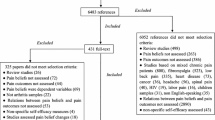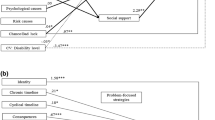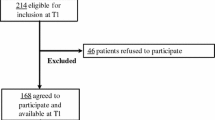Abstract
The current study investigated the influence of general causal attributions on self-reported physical disability over the course of 1 year in a sample of 42 patients with rheumatoid arthritis (RA). Participants completed measures of attributional style, pain, and disability; physician assistants completed objective measures of disability on two occasions, approximately 1 year apart. Results indicated that internal attributions for disease-unrelated negative events assessed at Time 1 were associated with lower perceived physical disability, whereas stable attributions for negative events were associated with greater perceived physical disability 1 year later. These findings are discussed in terms of behavioral and characterological self-blame models, respectively. Implications of our findings for clinical management of RA are also discussed.
Similar content being viewed by others
REFERENCES
Abramson, L. Y., Metalsky, G., & Alloy, L. (1989). Hopelessness depression:Atheory-based subtype of depression. Psychological Review, 96, 358-372.
Abramson, L. Y., Seligman, M. E. P., & Teasdale, J. D. (1978). Learned helplessness in humans: Critique and reformulation. Journal of Abnormal Psychology, 87(1), 49-74.
Allaire, S. H., Meenan, R. F., & Anderson, J. J. (1991). The impact of rheumatoid arthritis on the household work performance of women. Arthritis and Rheumatism, 34(6), 669-678.
Arnett, F., Edworthy, S., Bloch, D., McShane, D., Fries, J., Cooper, N., Healy, L., Kaplan, S., Liang, M., Luthra, H., Medsger, T., Jr., Mitchell, D., Neustadt, D., Pinals, R., Schaller, J., Sharp, J., Wilder, R., & Hunder, G. (1988). The American Rheumatism Association 1987 revised criteria for the classification of rheumatoid arthritis. Arthritis and Rheumatism, 31, 315-324.
Brown, J. D., & Siegel, J. M. (1988). Attributions for negative life events and depression: The role of perceived control. Journal of Personality and Social Psychology, 54(2), 316-322.
Callahan, L. F., Brooks, R. H.,& Pincus, T. (1988). Further analysis of learned helplessness in rheumatoid arthritis using a Rheumatology Attitudes Index. Journal of Rheumatology, 15, 418-426.
Chaney, J. M., Mullins, L. L., Uretsky, D. L., Doppler, M. J., Palmer, W. R., Wees, S. J., Klein, H. S., Doud, D. K., & Reiss, M. J. (1996). Attributional style and depression in rheumatoid arthritis: The moderating role of perceived illness control. Rehabilitation Psychology, 3, 205-223.
Chaney, J. M., Uretsky, D. L., Mullins, L. L., Doppler, M. J., Palmer, W. R., Wees, S. J., Klein, H. S., Doud, D. K., & Reiss, M. J. (1996). Differential effects of age and illness duration on pain–depression and disability–depression relationships in rheumatoid arthritis. International Journal of Rehabilitation and Health, 2(2), 101-112.
Cronbach, L. (1951). Coefficient alpha and the internal structure of tests. Psychometrika, 16, 297-334.
DeVellis, B. M., & Blalock, S. J. (1992). Illness attributions and hopelessness depression: The role of hopelessness expectancy. Journal of Abnormal Psychology, 101, 257-264.
Dowdy, S. W., Dwyer, K. A., Smith, C. A., & Wallston, K. A. (1996). Gender and psychological well-being of persons with rheumatoid arthritis. Arthritis Care and Research, 9(6), 449-456.
Frank, R. G., Chaney, J. M., Clay, D. L., & Kay, D. R. (1991). Depression in rheumatoid arthritis:Are-evaluation. Rehabilitation Psychology, 36, 219-230.
Fries, J. F., Spitz, P., Kraines, R. G., & Holman, H. R. (1980). Measurement of patient outcome in arthritis. Arthritis and Rheumatism, 23(2), 137-145.
Gerber, L. (1988). Outcome measures in rheumatic disease. In Hicks, J., Nichols, J., & Sweezy, R. (Eds.), Handbook of rehabilitative rheumatology(pp. 9-19). Atlanta, GA: American Rheumatism Association.
Hagglund, K. J., Haley, W. E., Reveille, J. D., & Alarcon, G. S. (1989). Predicting individual differences in pain and functional impairment among patients with rheumatoid arthritis. Arthritis and Rheumatism, 32(7), 851-858.
Hewlett, S., Young, P.,& Kirwan, J. (1995). Dissatisfaction, disability, and rheumatoid arthritis. Arthritis Care and Research, 8(1), 4-9.
Hidding, A., van Santen, M., De Klerk, E., Gielen, X., Beers, M., Geenen, R., Vlaeyen, J., Kester, A., & van der Linden, S. (1994). Comparison between self-report measures and clinical observations of functional disability in ankylosing spondylitis, rheumatoid arthritis, and fibromyalgia. Journal of Rheumatology, 21, 818-823.
Hollingshead, A. (1957). Two factor index of social position.New Haven, CT: Author.
Holm, M. B., Rogers, J. C., & Kwoh, C. K. (1998). Predictors of functional disability in patients with rheumatoid arthritis. Arthritis Care and Research, 11(5), 346-355.
Hommel, K. A., Chaney, J. M., Mullins, L. L., Palmer, W., Wees, S., & Klein, H. (1998). The relative contributions of attributional style and arthritis helplessness to depression in rheumatoid arthritis: A longitudinal investigation. International Journal of Rehabilitation and Health, 4(1), 59-67.
Liang, M. H., Cullen, K., & Larson, M. (1982). In search of a more perfect mousetrap (health status or quality of life instrument). Journal of Rheumatology, 9, 775-779.
Lorish, C. D., Abraham, N., Austin, J., Bradley, L. A., & Alarcon, G. S. (1991). Disease and psychosocial factors related to physical functioning in rheumatoid arthritis. Journal of Rheumatology, 18(8), 1150-1157.
McCracken, J. M. (1991). Cognitive-behavioral treatment of rheumatoid arthritis:Apreliminary review of efficacy and methodology. Annals of Behavioral Medicine 13(2), 57-65.
Nicassio, P., Wallston, K., Callahan, L., Herbert, M., & Pincus, T. (1985). The measurement of helplessness in rheumatoid arthritis: The development of the Arthritis Helplessness Index. Journal of Rheumatology, 12, 462-467.
O'Leary, A., Shoor, S., Lorig, K., & Holman, H. R. (1988). A cognitive-behavioral treatment for rheumatoid arthritis. Health Psychology, 7(6), 527-544.
Peterson, C. (1988). Explanatory style as a risk factor for illness. Cognitive Therapy and Research, 12(2), 119-132.
Peterson, C., Maier, S. F., & Seligman, M. E. P. (1993). Learned Helplessness: A Theory for the Age of Personal Control.New York, NY: Oxford University Press.
Peterson, C., & Seligman, M. E. P. (1984). Causal explanations as risk factors for depression: Theory and evidence. Psychological Review, 91, 347-374.
Peterson, C., Semmel, A., von Baeyer, C., Abramson, L., Metalsky, G., & Seligman, M. (1982). The Attributional Style Questionnaire. Cognitive Therapy and Research, 6, 287-300.
Pincus, T., Summey, J., Soraci, S., Wallston, K., & Hummon, N. (1983). Assessment of patient satisfaction in activities of daily living using amodified Stanford Health Assessment Questionnaire. Arthritis and Rheumatism, 26, 1346-1353.
Schiaffino, K. M., & Revenson, T. A. (1992). The role of perceived self-efficacy, perceived control, and causal attributions in adaptation to rheumatoid arthritis: Distinguishing mediator from moderator effects. Personality and Social Psychology Bulletin, 18(6), 709-718.
Schiaffino, K., & Revenson, T. (1995). Why me? The persistence of negative appraisals over the course of illness. Journal of Applied Social Psychology, 25, 601-619.
Smith, C., Wallston, K., & Dwyer, K. (1995). On babies and bathwater: Disease impact and negative affectivity in the selfreport of persons with rheumatoid arthritis. Health Psychology, 14, 64-73.
Smith, T., Christensen, A., Peck, J., & Ward, J. (1994). Cognitive distortion, helplessness, and depressed mood in rheumatoid arthritis: A four-year longitudinal analysis. Health Psychology, 13, 213-217.
Smith, T. W., Peck, J. R., Milano, R. A., & Ward, J. R. (1988). Cognitive distortion in rheumatoid arthritis: Relation to depression and disability. Journal of Consulting and Clinical Psychology, 56(3), 412-416.
Smith, T., Peck, J., & Ward, J. (1990). Helplessness and depression in rheumatoid arthritis. Health Psychology, 9, 377-389.
Spiegel, J. S., Leake, B., Spiegel, T. M., Paulus, H. E., Kane, R. L., Ward, N. B.,& Ware, J. E. (1988). What are we measuring? An examination of self-reported functional status measures. Arthritis and Rheumatism, 31(6), 721-728.
Stein, M., Wallston, K., & Nicassio, P. (1988). Factor structure of the Arthritis Helplessness Index. Journal of Rheumatology, 15, 427-432.
Stein, M. J., Wallston, K. A., Nicassio, P. M., & Castner, N. M. (1988). Correlates of a clinical classification schema for the arthritis helplessness subscale. Arthritis and Rheumatism, 31(7), 876-881.
Tennen, H., Affleck, G.,& Gershman, K. (1986). Self-blame among parents of infants with perinatal complications: The role of self-protective motives. Journal of Personality and Social Psychology, 50(4), 690-696.
Ward, M. M., & Leigh, J. P. (1993). The relative importance of pain and functional disability to patients with rheumatoid arthritis. Journal of Rheumatology, 20(9), 1494-1499.
Wilder, R. (1993). Rheumatoid arthritis. In H. R. Schumacher, Jr., J. H. Klippel, & W. J. Koopman (Eds.), Primer on the rheumatic diseases(10th ed., pp. 86-89). Atlanta, GA: Arthritis Foundation.
Wright, G. E., Parker, J. C., Smarr, K. L., Schoenfeld-Smith, K., Buckelew, S. P., Slaughter, J. R., Johnson, J. C., & Hewett, J. E. (1996). Risk factors for depression in rheumatoid arthritis. Arthritis Care and Research, 9(4), 264-272.
Author information
Authors and Affiliations
Rights and permissions
About this article
Cite this article
Hommel, K.A., Chaney, J.M., Mullins, L.L. et al. The Contribution of Attributional Style to Perceived Disability in Rheumatoid Arthritis: A Longitudinal Study. Journal of Clinical Psychology in Medical Settings 7, 113–120 (2000). https://doi.org/10.1023/A:1009543631311
Issue Date:
DOI: https://doi.org/10.1023/A:1009543631311




